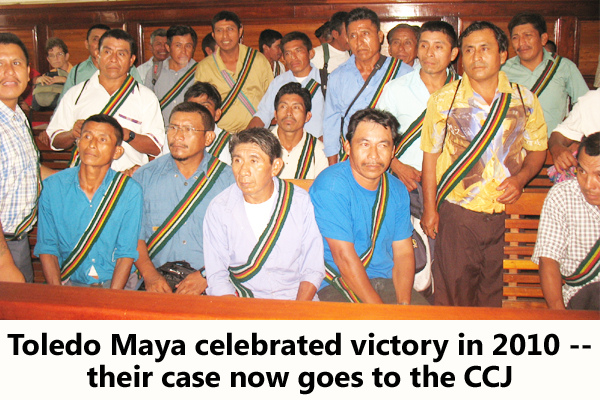The land rights dispute between the Maya of southern Belize and the Government of Belize will be heard by the Caribbean Court of Justice (CCJ), following a decision by the Belize Court of Appeal on Friday to grant leave to the parties to challenge a decision granted by the Court of Appeal earlier this year.
In that decision, two of three judges upheld the customary land rights of the Maya of southern Belize, but they went further to rescind orders of the lower court which mandated the Government to give effect to those rights, such as orders for the Government to work with the Maya to demarcate lands and orders which restrained the Government from unilaterally issuing oil contracts and logging concessions on what the Maya deem to be their ancestral lands.
Antoinette Moore, SC, told Amandala that the Toledo Alcaldes Association (TAA), the Maya Leaders Alliance (MLA) and the villagers challenging the Court of Appeal decision have 21 days to file their claim with the CCJ.
Of note, though, is that the Government of Belize is also challenging the Court of Appeal decision. Denys Barrow, SC, told our newspaper that the minority decision issued by the president of the Court of Appeal, Justice Manuel Sosa, means that a very important question is left to be resolved: that is, whether the Maya of Toledo can truly claim indigenous rights, since the judge seems to agree with the Government’s assertions that they are migrants to this part of the Central American isthmus.
The Government will argue their case in a cross-appeal to the CCJ case.
Senior Counsel Moore told Amandala that what this means is that “essentially the whole case will be under review by the CCJ.”
“The Maya Leaders Alliance, the Toledo Alcaldes Association, and the villagers are seeking a review of the portion they lost, which had to deal with the injunctive relief and the title demarcation – the obligations of the Government to protect the land; and the Government is appealing the portion of the case which affirms customary land rights. There is nothing else for them to appeal,” Moore told us.
She said that the land rights issue is really the primary underlying issue in the case.
Friday’s decision to allow the appeal was issued by President Sosa, Justice Dennis Morrison, and Justice Samuel Awich. The Maya have until November 22 to file their appeal with the CCJ.
Moore said that, “Whatever decision the CCJ makes will be persuasive and have implications for the Caribbean and the broader Commonwealth.”
Senior Counsel Barrow, too, believes that the CCJ hearing is necessary to resolve some vital issues:
“President Sosa gave a breathtaking survey of the law regarding indigenous persons – what qualifies you to be classified as an indigenous or as a descendant of the indigenous people, and his decision was that the Maya were migrants and not indigenous persons in Belize,” Barrow said, referring to the minority decision in the Court of Appeal case.
Barrow said that it is the Government’s position, in view of dissenting opinion by Sosa, that it has a duty, in the public interest, to have the matter resolved. He noted that two judges had a differing view and the third concurred with one of the two, in favor of the Maya.
“It does not establish the kind of certainty which is needed. If the CCJ decides that Justice Sosa was wrong, fine! But the CCJ may decide that Sosa was correct…” Barrow told us.
Could such a decision in any way unsettle the ruling which former Chief Justice Abdulai Conteh made in favor of Conejo and Santa Cruz, Toledo, which the Government did not appeal?
“No, it cannot alter the decision,” Barrow conceded.
He said that the Conteh decision (issued in 2007) remains binding on the Government, as well as Conejo and Santa Cruz; although an opposite ruling by the CCJ would mean “you will have the anomaly that that decision stands but a later, higher decision shows that it was wrong…”
Of note is that a decision is pending from the Supreme Court in the challenge by four Maya communities in Toledo and the Sarstoon Temash Institute of Indigenous Management (SATIIM), joined by the Association of Protected Areas Management Organizations (APAMO) – which are together seeking the court’s intervention against a decision by the Government to grant an oil contract to US Capital Energy over what they maintain are ancestral lands, and to furthermore issue a permit to the oil company to drill inside a national park, when such activities are prohibited under the National Parks Systems Act.
Senior Counsel Barrow is also the Government’s lawyer in that Supreme Court case.

